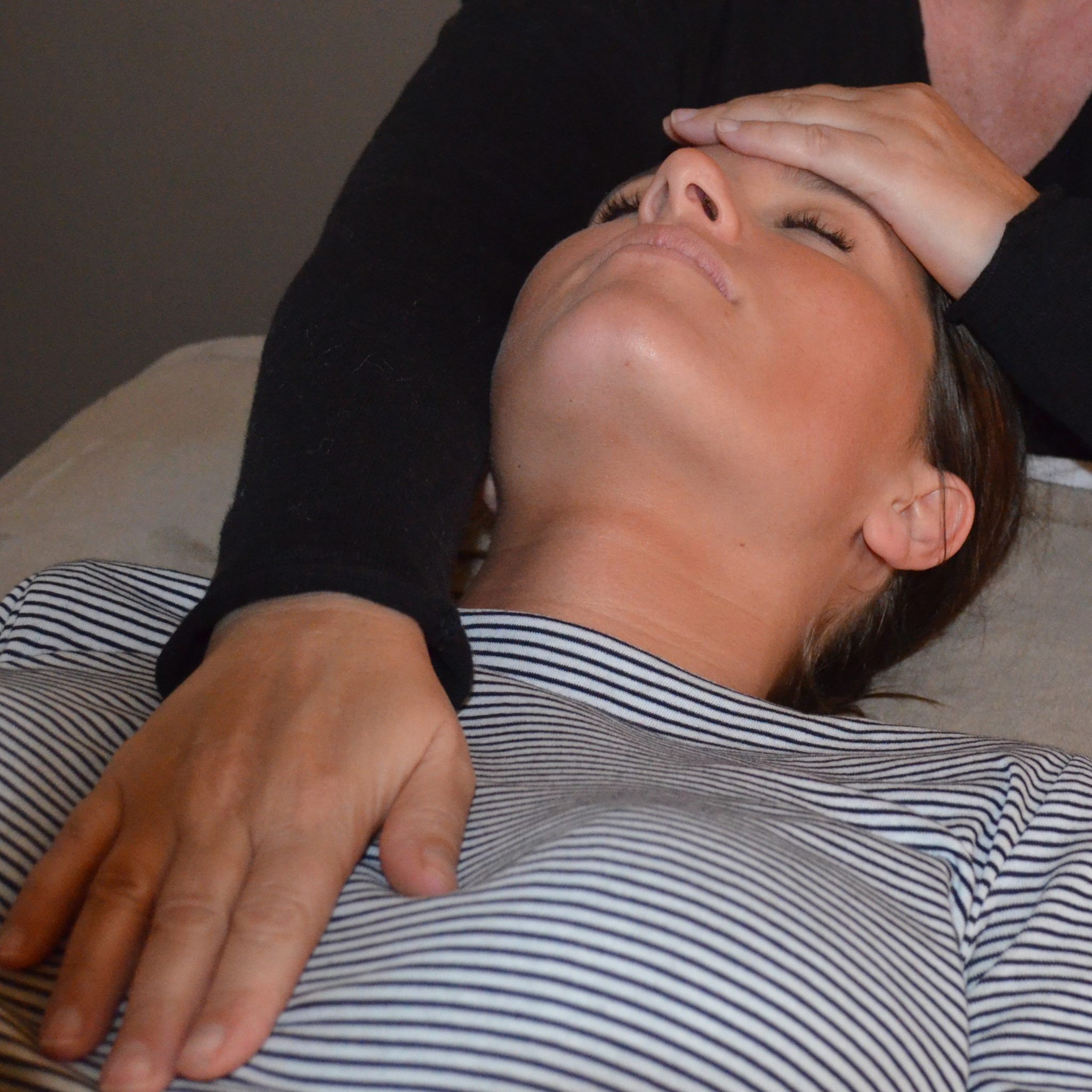Craniosacral Therapist Sharon Hartnett Worthington+Columbus
Learn About Sharon’s Work
What Does Craniosacral Therapy Help?
Key Benefits of Craniosacral Therapy-shared by Sharon Hartnett at Lighten Up Therapies in Columbus, Ohio
-
Relieves Chronic Pain
Eases back pain, neck stiffness, and TMJ dysfunction by releasing deep tension in the cranial bones and spine. -
Reduces Headaches & Migraines
Improves fluid flow and eases restrictions to lower migraine and tension headache frequency. -
Balances the Nervous System
Activates the parasympathetic response (“rest and digest”) to calm stress and support equilibrium. -
Promotes Deep Relaxation
Gently lowers anxiety and cortisol levels, inviting a state of profound ease and stillness. -
Improves Sleep
Calms nervous system overactivity and releases held tension, supporting deeper, more restful sleep. -
Boosts Immune Function
Encourages lymphatic flow and internal balance to support the body’s natural healing abilities. -
Supports Trauma Recovery
Provides a safe space for releasing stored emotional and physical trauma, building inner resilience. -
Restores Movement & Flexibility
Frees fascial restrictions and enhances range of motion in joints and tissues. -
Encourages Whole-Person Healing
Aligns body, mind, and spirit—promoting self-awareness, clarity, and inner peace. -
Complements Medical Care
Integrates beautifully with treatments for fibromyalgia, fatigue, and chronic health concerns.

Sharon Hartnett CST-D
Prices are $150.00 per 75 minute Session
Package Deals Available upon request.
Listening with my hands and skillful technqiues opens doorways for transformation. It all comes down to this and compassionate holding.
To find out more about craniosacral therapy with Sharon Hartnett, go to my main page.

Specifically About Sharon Hartnett, CST-D
I have an integrative practice, primarily using a Hakomi Approach to healing with all of my clients. This include Mindfulness, Organicity, Unity, and focuses on Mind Body Wholism. I use a gentle non-judgment approach as a Hakomi graduate, in present moment, to support transformation.
With some people, we sit and explore. For other clients, I offer Visceral Manipulation, Brennan Energy Healing upon request, Structural Integration, Inter-Species Healing, CST, Somatic Therapy, Spiritual Transformation Work and more. I have been in the healing field for about 30 years.
614-653-8111
The Art of Healing Through Listening
In addition, as a Diplomate Certified Craniosacral Therapist through the renowned Upledger Institute, I’ve spent years developing the skill, presence, and deep listening required for this subtle yet powerful healing work. Earning the CST-D credential reflects a high level of dedication and advanced training—available only to those who complete extensive testing and demonstrate clinical excellence.
I offer gentle, trauma-informed Craniosacral Therapy for women and those seeking a holistic approach to healing. Whether you’re navigating chronic pain, stress, or emotional overwhelm, I create a safe, supportive space for your nervous system to unwind and restore.
What Sets Sharon Hartnett- Craniosacral Therapist Apart?
Not all therapists are the same. Here are the qualities I believe truly define exceptional Craniosacral care:
-
Advanced Certification: True Craniosacral Therapy begins with deep study. Certification—especially Diplomate level—means your therapist has moved beyond student status and mastered the art of this subtle work.
-
Years of Experience: With time, sensitivity to the body’s rhythms becomes more refined, allowing for precise, effective treatment.
-
Light, Skilled Touch: A hallmark of CST is the feather-light touch that accesses deep healing without force.
-
Empathy & Compassion: Healing happens in safety. I hold space with presence and care, so your system can soften and trust.
-
A Holistic View: I work with the whole person—not just physical symptoms—to help resolve root imbalances.
-
Clear Communication: I’ll explain the process, answer questions, and help you feel informed every step of the way. I’m also trained in SomatoEmotional Release, a technique that supports emotional release through the body.
-
Ethical Integrity: I maintain clear boundaries, professional standards, and prioritize your well-being at every visit.
-
Lifelong Learning: Healing is an evolving art. I continue to study, refine, and deepen my work so I can offer the highest level of care.
-
Service to the Greater Good: This work isn’t just a profession—it’s a calling. I offer each session with the intention to support healing and wholeness on all levels.
Finding the Right Therapist
Choosing a Craniosacral Therapist is a personal decision. Here are a few tips:
-
Read Reviews: See what others are saying about their experiences.
-
Ask Questions: Inquire about training, certifications, and specializations.
-
Trust Your Intuition: The right fit will feel safe, warm, and aligned with your needs.
Ready to Begin?
If you’re ready to experience the benefits of Craniosacral Therapy with someone who truly listens and honors your process, I invite you to schedule a session.
Call or text 614-653-8111
Located in Worthington, serving Columbus and surrounding areas.
Let’s work together to bring your body, mind, and spirit back into balance.
My Background
I was always interested in healing. As I child, being a twin- I sensed things that other people didn’t notice. Questions always arose for me about how to bridge and incorporate the subtle and the obvious. As I grew up, I realized this took skill and practice.
In my 30’s I found a book written by Dr. Barbara Brennan, “Hands of Light”, that intrigued me. She spoke about chakras and energy,as well as character strutures. After reading this, he Unknown, and the mystery became a life time exploration for me.
My main focus became clear. I wanted to help people to find fluidity and health in motion. Also, I wanted to help people to find their own path to wellness. What this means to me is developing and sustaining a dynamic and integrated sense of awareness in embodiment. So I studied somatic therapies both from a bodyworker perspective as well as from a psychological point of view. I went to many schools and absorbed everything I could. Ultimately, I realized “presence” and then techniques were what was truly important in contact and healing.
I am passionate about awakening and evolution for individuals, as well as families, communities, societies and the whole world. It means a lot to me to see people discover their best selves. That my life’s work!
Also, I believe that the human intimacy between a manual therapist and a person looking for help is a powerful therapeutic alliance: Research emphasizes how intentional touch establishes a deep therapeutic bond—co‑regulating the nervous system and bringing about deep healing. It’s a sacred experience.
Have you Heard of Hakomi?
Hakomi is a mindfulness-based, somatic psychotherapy developed by Ron Kurtz that is based on uncovering and changing unconscious core beliefs. It supports any processing and unfolding of trauma by helping individuals study their own habitual patterns from a body centered perspective. It fosters healing on many different levels.
My background and license is not as a psychotherapist. However, I trained in Hakomi and advanced Barbara Brennan School training, with psychologists, bodyworkers, and social workers to uphold the principles held through Hakomi and BBSH with my clients.
The Hakomi Principles help to create a safe and compassionate environment for you to heal.

